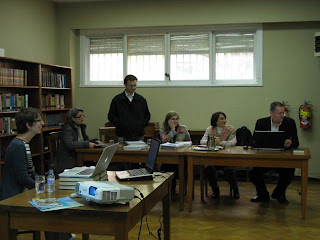What I've learnt
 |
| listening to Marga |
Being back in Argentina brings me back to my blog.
After seven years, I defended my thesis at ISEDET, Buenos Aires on Monday. Yesterday, on the long bus ride from the ciudad porteña to the second city of Cordoba, as the fields, granjas and gomerías trundled by, I thought about what I'd learnt.
1. Despite the solitary nature of doctoral research, theology is a collective task. As is often said about any thesis, book or creative work, it is done with, and with the help of, others. Even more so when you are writing between continents and languages. As I looked around ISEDET library on Monday afternoon, there they were: compañeros y compañeros from ISEDET, from MEDH, from Teologanda. From inviting me to visit the defensorías to printing copies of the thesis; from translating the text to guiding me in preparing conference papers; from finding cables for the projector to finding an external examiner. It is the work of many, and, that means, that I cannot be selfish about it. Although I'm ready to put it behind me, I am realising that I do owe it to others to look into publishing some or part of it, in some form or another.
 |
| tortas y café |
2. The word of the defence was 'sacrifice', more than 'marriage' or 'survival'. Even though my focus has perhaps shifted to exploring the impact of models of marriage on domestic violence, what people resonated most with was the dangers of sacrifice. The belief that 'no-one is ever saved by sacrifice'* - and the importance of proclaiming that belief - was shared insistently, urgently.
3. Theology is practical. It's easy to forget this but it is. It's practical in that the organisation of the mesa de tortas was as important as that of the mesa academica. And it's practical because what we write about when we write about theology impacts on how we live, one way or another, whether this is acknowledged or not.
*Ivone Gebara or Elsa Tamez?
Comments